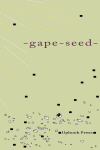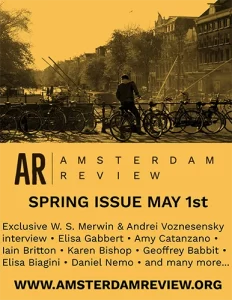–gape–seed–
Spoken word is powerful not only in language, but also performance. It can be difficult to capture the essence and emotion on the page; however, the writers in –gape–seed– have done just that. The diverse selection of poetry made it difficult to choose the best writers as each distinct piece had punch and power. At first I was wary; making a successful anthology of spoken word seemed like a tall order, but –gape–seed– inspired me to really feel the language as opposed to just reading it.
Spoken word is powerful not only in language, but also performance. It can be difficult to capture the essence and emotion on the page; however, the writers in –gape–seed– have done just that. The diverse selection of poetry made it difficult to choose the best writers as each distinct piece had punch and power. At first I was wary; making a successful anthology of spoken word seemed like a tall order, but –gape–seed– inspired me to really feel the language as opposed to just reading it.
At the beginning of the book, Kelly Powell captured my attention with her poem “What if Buddha was a Moving Man?” The moving man is described as “The one driving the truck smoking / a cigar and belching, showing up drunk / and breaking the credenza.” She humanizes the god we are familiar with and allows him to make mistakes and grow as an individual. Rather than holding Buddha to the standards of a higher being, Powell presents us with a contemplative piece of poetry that considers many trials regular people face in our world. For example, consider: “What if his wife has just left him?” This is a situation we are familiar with either personally or through friends/family. Sometimes, higher beings can be hard to relate to as they are considered to be perfect entities; however, stripping away that perfection allows us to connect.
Joan Gelfand treats us to a poem about the infamous Sylvia Plath, titled “I Know why Sylvia Plath put her Head in the Oven.” She takes us through the day that Plath killed herself and takes us through the stress that pushed Plath over the edge. Her husband leaves for work and Plath is faced with dishes, leftovers, kids to take care of, laundry, spills: the mess of having a family. This family has completely taken over her freedom to write:
She woke with nuggets of poetry
A raging head but the babies needed breakfast
And poems evaporated like English fog
Lifting off the Devon trees.
Plath feels as if “everything has gone wrong.” This is not the life she wanted and her writing suffers so severely that she sacrifices ideas and “nuggets” to take care of her children. In the end, Plath cannot reconcile her art with her family which becomes her ruin.
This anthology features Regie Cabico, a pioneer in the spoken word industry. Uphook Press includes an interview with Cabico in the book to introduce his poetry. He has won countless awards and competed at the national level, and his work has been included in over 30 collections. When asked about the up—and downsides—of poetry as competition, Cabico admits that “regarding the poetry slam, it’s an imperfect beast. It brings out the Black Swan from the poet and sucks the duende from your soul.” A lot of hate has stemmed from slamming; however, Cabico has actively worked to promote acceptance of all backgrounds and different ways of life.
In his poetry, Cabico speaks of past lovers and reveals many specific details that bring us into his life and relationships. Instead of giving us a broad, bland overview, he allows us to peer into his sexual interactions in his poem “A Midlife Crisis of the Olfactory Kind”:
When I went back to The Neverland Bar,
a hobbit offered to suck my dick.
I turned around and said, “That is the nicest thing
anyone has ever said to me!” His offer smelled
a thousand pokes on Facebook
and an episode of Extreme Home Makeover.
I explained to him, I don’t want a boyfriend.
I just want to have sex with a guy on a regular basis
whose name I know.
Poetry should make you appreciate the art of experience. Spoken word allows a reader to sit back and be transported to another world. It is truly impressive when spoken word translates to paper just as powerfully, as the writers in this anthology have accomplished.





